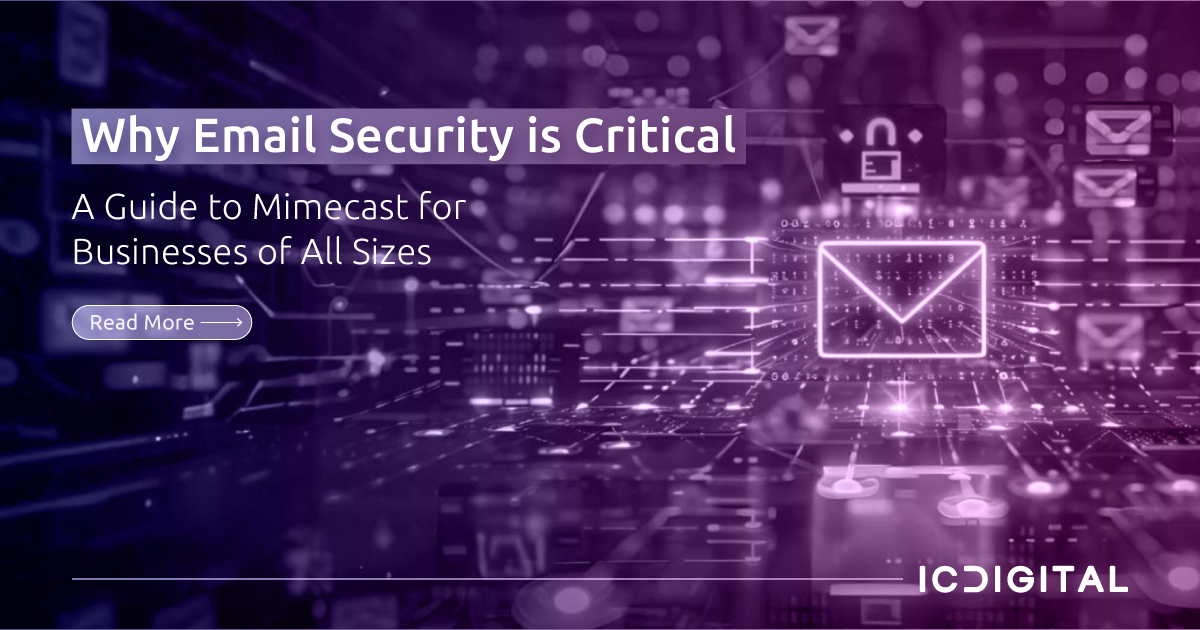
Why Email Security is Critical: A Guide to Mimecast for Businesses of All Sizes

In an era where digital communication dominates, email remains the most popular and convenient form of business interaction. But with this convenience comes significant risk. Cyberattacks targeting emails are increasing in frequency and sophistication, making email protection a critical element of a company’s overall cybersecurity strategy. Whether you’re a small startup or a large enterprise, having strong email security in place is no longer optional—it’s essential.
This guide will explore why email security is so important and how Mimecast Email Security offers robust cybersecurity for companies of all sizes.
The Growing Threat of Email-Based Cyberattacks
Emails are the primary communication channel for most businesses, which makes them a prime target for cybercriminals. According to recent studies, over 90% of cyberattacks begin with a simple email. These attacks can range from phishing scams to ransomware, malware, and data breaches.
Here are a few common email-based cyber threats:
Phishing Attacks:
Cybercriminals send deceptive emails pretending to be legitimate companies or individuals, tricking employees into revealing sensitive information, such as passwords or financial details.
Ransomware:
Malicious attachments or links sent via email can infect a company’s system, locking up critical data until a ransom is paid.
Business Email Compromise (BEC):
Attackers pose as company executives, tricking employees into transferring money or sensitive information to unauthorised accounts.
Malware:
Emails can carry hidden malware in attachments or embedded links, compromising a company’s entire system when clicked or downloaded.
With the increasing sophistication of these attacks, relying solely on basic security measures like spam filters is no longer enough.
Why Email Security is Critical for Companies?
For businesses, a single cyberattack can lead to significant financial losses, damaged reputation, legal liabilities, and even operational disruptions. Here’s why email security should be a top priority:
Protecting Sensitive Data:
Emails often contain confidential business information such as contracts, financial records, and customer data. A breach could result in data loss or theft, which can be devastating for any business.
Ensuring Business Continuity:
Cyberattacks can disrupt daily operations by disabling email systems, leading to communication breakdowns. Having a secure email infrastructure ensures that your business runs smoothly, even during an attack.
Maintaining Customer Trust:
Clients and customers trust companies to protect their sensitive information. A data breach caused by poor email security can damage this trust, affecting long-term relationships and brand reputation.
Regulatory Compliance:
Many industries require strict data protection standards to meet regulations. Failing to secure email communications can result in legal penalties and fines.
How Mimecast Email Security Protects Your Business
Mimecast Email Security is designed to offer advanced, multi-layered email protection that secures businesses from email-borne cyber threats. Whether you are a small business or a large corporation, Mimecast’s solutions scale to meet your needs, providing comprehensive protection across all your email communications.
Mimecast for Companies of All Sizes
Whether you’re a small business just starting out or a large enterprise dealing with high volumes of email traffic, Mimecast Email Security offers scalable solutions tailored to your needs. Here’s why businesses of all sizes trust Mimecast for their cybersecurity needs:
- Scalability: Mimecast’s solutions are designed to grow with your business, ensuring you always have the right level of protection.
- Ease of Use: With a user-friendly interface and seamless integration with existing email systems, Mimecast makes it easy for companies to implement and manage their email security.
- Cost-Effective: Mimecast’s comprehensive security packages ensure businesses of all sizes can access top-tier protection without the need for complex or costly systems.
The Future of Email Security: Staying Ahead of Threats
As cyber threats continue to evolve, companies must remain proactive in defending their email systems. Email security is no longer just a preventative measure—it’s a necessary defence against constant attacks. Mimecast’s continuous threat intelligence updates ensure your company is always protected against the latest cyber attacks.
Conclusion
In today’s threat landscape, email security is critical to maintaining a safe and productive business environment. With Mimecast Email Security, companies can protect themselves from a wide range of cyber threats, from phishing and ransomware to data breaches. Whether you are a small business or a large corporation, Mimecast offers scalable and effective cybersecurity for companies, ensuring that your email communications remain secure.
Download the Mimecast State of Email Security 2024 Report and discover how your business can stay protected from emerging email-based threats.
